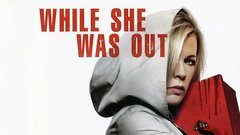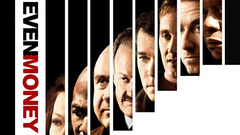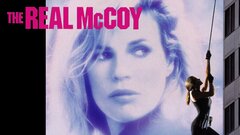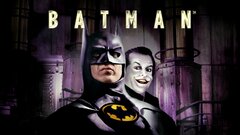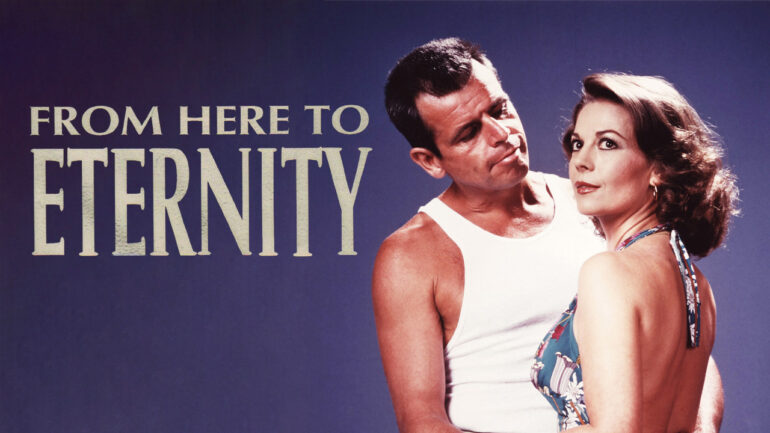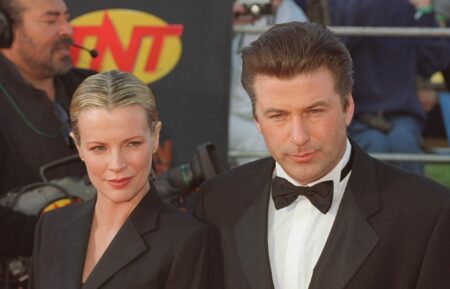Kim Basinger gave an Academy and Golden Globe Award-winning performance in Curtis Hanson's neo-noir crime drama "L.A. Confidential" (1997). While often cast for her ethereal beauty, the root of Basinger's real gift was her ability to imbue even her most extroverted characters with a gentle vulnerability, and to offer well-crafted characterizations of increasingly interesting and complex women.
Kimila Ann Basinger was born Dec. 8, 1953, and raised in Athens, GA. Painfully shy from the outset, the Southern belle reportedly fainted whenever she had to speak in front of the class. That fear, however, was offset by a genetic predisposition towards performing, as she was the daughter of a big band musician father and a mother who had been a silver screen swimmer alongside movie star, Esther Williams, in those classic MGM Technicolor spectacles. Young Basinger studied dance to overcome her shyness, and by the time she was a teenager, she was entering local beauty pageants, which eventually led to a slot in the National Junior Miss Pageant and an offer to model with the acclaimed Ford Agency in New York City.
Basinger harbored hopes of being a singer or an actress, but accepted the offer and headed to New York with hopes that modeling might help her get her foot in other doors. Over the next five years, she found steady and lucrative work as a cover girl and in hundreds of ads, including a stint as the face (and hair) of Breck shampoo. She studied acting at the Neighborhood Playhouse during this time, and in 1976, finally decided to focus on acting with a move to Los Angeles.
Due in large part to her buxom body and unique look, Basinger's acting career began right away, with guest appearances on shows like "Starsky & Hutch" (ABC, 1975-79) and "Charlie's Angels" (ABC, 1976-1981). She landed a regular series TV role as a cop in the short-lived ABC series "Dog and Cat" in 1977, and a title role in the TV movie "Katie: Portrait of a Centerfold" (NBC, 1978) which helped establish her image as a model-turned-actress. The following year, she was cast as a prostitute - in an Oscar-winning role originated on the big screen by Donna Reed - in the 1979 miniseries remake of "From Here to Eternity" (NBC) and its short-lived series spin-off the following year.
Despite additional roles in TV-movies, Basinger did not seem to click on the small screen, but her big screen debut was promising, with the actress's Southern accent helping her win the role of the forlorn girlfriend of cowboy Jan-Michael Vincent in the well-received "Hard Country" (1981). In another outdoorsy film, "The Mother Lode" (1982), she co-starred with director and movie legend, Charlton Heston. Her career gained momentum in 1983 after she appeared as Bond Girl, Domino Petachi, in Sean Connery's return to OO7 form in "Never Say Never Again" (1983). It did not hurt that she promoted the film with a nude layout in Playboy magazine, further raising her profile.
After co-starring with Burt Reynolds in Blake Edwards' remake of "The Man Who Loved Women" (1983), Basinger upped the ante with a supporting role as the femme fatale who romances Robert Redford in "The Natural" (1984), earning the actress a Golden Globe nomination. In the first of several collaborations with director Robert Altman, she played Sam Shepard's half-sister in an adaptation of the playwright's Off-Broadway hit "Fool for Love" (1985). She acquitted herself well in the role, but followed up with a string of misfires in the late 1980s, beginning with Adrian Lyne's style-over-substance examination of an obsessive relationship in "9 1/2 Weeks" (1986).
The erotic film was popular with audiences, and did present Basinger with an acting challenge, but it did little to distance her from her image as a sex object-turned-actress. Her attempts at comedy, while admirable, suffered at the hands of weak material, as in Blake Edwards' "Blind Date" (1987) or "My Stepmother Is an Alien" (1988). The actress finally found a better showcase of her talents, balancing the va-voom with a sweet vulnerability, in her role as voluptuous Vicki Vale, love interest for Michael Keaton's "Batman" (1989).
The 1940s-set romantic comedy "The Marrying Man" (1991) proved to be a mixed blessing for Basinger. It ignited a long-lasting offscreen romance with co-star Alec Baldwin, but the pair earned an unshakeable image in the gossip columns for being prima donnas, with Baldwin unleashing tirades on the ineptitudes of the studio (Disney). At the end of the day, it was a flop with critics and audiences, and the couple's reputation as "difficult" was hard for them to shake.
The same year, Basinger was at the center of controversy yet again when she backed out of an agreement to star in "Boxing Helena" (1993), an unsettling amputee love story from Jennifer Lynch. The filmmakers sued Basinger for breach of contract and won $8 million in settlement, which although overturned, forced Basinger to file for bankruptcy over the legal fees. The painfully private actress soldiered through the string of public embarrassments, rebounding as a cartoon vamp who becomes human in Ralph Bakshi's live action/animated mishmash "Cool World" (1992), and in a cameo as Honey Hornee in the "Saturday Night Live" sketch sequel, "Wayne's World 2" (1993).
After marrying Baldwin in 1993, the newlyweds teamed up for an inferior remake of Steve McQueen's "The Getaway" (1994), though Basinger did acquit herself in a gritty change-of-pace role. That same year, Basinger was quite good as a pushy fashion reporter in Robert Altman's otherwise overblown and meandering "Ready-to-Wear (Pret-a-Porter)." The actress then took a much-needed three-year hiatus, which included giving birth to a daughter, Ireland.
Back in the game, she triumphantly returned to films after being talked into it by director Curtis Hanson, who imagined no other actress than Basinger in the role of a 1950s-era Hollywood call girl with more than a passing resemblance to screen star Veronica Lake in his classic film noir homage, "L.A. Confidential" (1997). Critics lauded the film and Basinger in particular, with the actress riding this acclaim all the way to a Best Supporting Actress Academy Award in 1998.
Unfortunately, Basinger seemed unable to capitalize professionally on her Oscar triumph, making only two tepidly received films from 1997 to 2001: "I Dreamed of Africa" (2000), in which she played a woman recently transplanted to the Dark Continent who discovers both the splendors and the shadowy underbelly of her new home, and "Bless the Child" (2000), a dreary Satanic thriller.
In 2001, Basinger and Baldwin's marriage - typically portrayed as one of the more idyllic in Hollywood - endured intense media scrutiny when the couple filed shockingly for divorce. Baldwin's temper had been tabloid fodder before, when he exploded on paparazzi photographers who tried to photograph his wife and newborn daughter, but sadly the couple's split led to years of high profile vitriol over a contentious custody battle.
At the time of her acrimonious divorce, Basinger appeared in the HBO documentary "Panic: A Film About Coping," where she admitted that she suffered from panic attacks and agoraphobia, which could cause her to hole up at home for up to six months at a time. With a bit of public sympathy in her corner following the admittance of her disorder, Basinger fought to bring attention back to her career, delivering a run of excellent onscreen performances.
She re-teamed with director Hanson to star as Eminem's troubled mother in "8 Mile" (2002), a fictionalized telling of the hip-hop artist's rise from the streets of Detroit. She followed up with a role opposite Al Pacino in the PR-minded, scandal mongering "People I Know" (2003), where she played the weepy widow of Pacino's suicidal brother with delicate grace. In the John Irving adaptation "The Door in the Floor" (2004), Basinger co-starred with Jeff Bridges as a couple whose painful loss causes them to exist in a constant state of quiet emotional war.
Basinger invested her performance with a heartbreaking, emotionally hungry quality, prompting critic Roger Ebert to comment, "There can be something hurt and vulnerable about her, a fear around the eyes, a hopeful sweetness that doesn't seem to expect much." Those same qualities helped enliven her next effort, the pop thriller "Cellular" (2004), a slickly crafted film in which she played a kidnapped science teacher who desperately communicates with a stranger (Chris Evans) through a rigged cell phone. At times gimmicky and ingenious in its complications and plot twists, the film was benefitted by Basinger's utterly believable desperation.
Again, the actress' performance anchored the farfetched love story, "The Mermaid Chair" (2006), a Lifetime movie adaptation of Sue Monk Kidd's novel about a middle-aged woman at crossroads who falls in love with a monk.
Despite her efforts onscreen, however, Basinger's private life exposed proved even more titillating than her work. In 2006, Baldwin and Basinger's ongoing custody battles over Ireland reached their apex when Baldwin accused his ex-wife of releasing a phone message left for their daughter, in which the enraged actor called Ireland "a rude little pig." Although Baldwin rightfully took the brunt of the public ire for his remarks, Basinger was also on the receiving end of scorn for allegedly releasing the private tape in the first place.
As the voicemail circus wound down, Basinger returned to the screen in the role of an author with a secret gambling addiction in the little seen ensemble drama "Even Money" (2007). Basinger also starred in two higher profile projects, starting with "The Informers" (2009), based on the short stories of Bret Easton Ellis, where she took on the challenge of playing a dysfunctional, drug-addicted mom having an affair with a teenager. She teamed up with Charlize Theron that same year to star in the family drama "The Burning Plain," the directorial debut of screenwriter Guillermo Arriaga.















